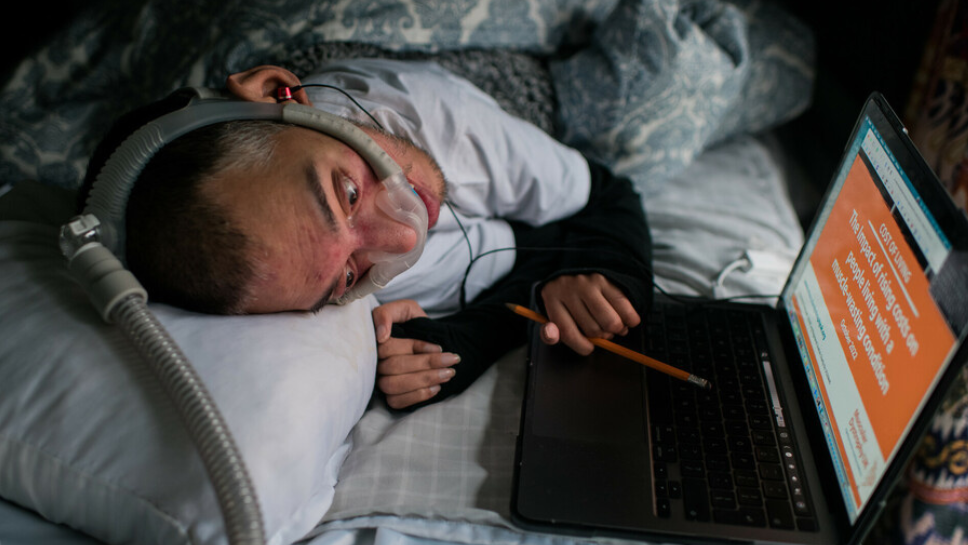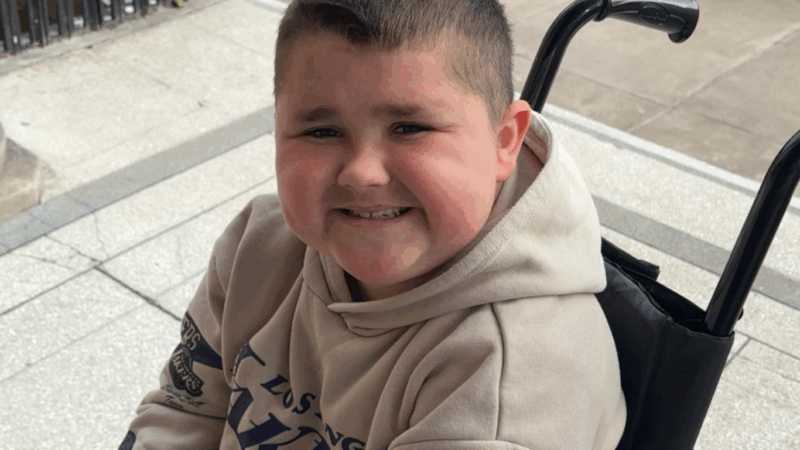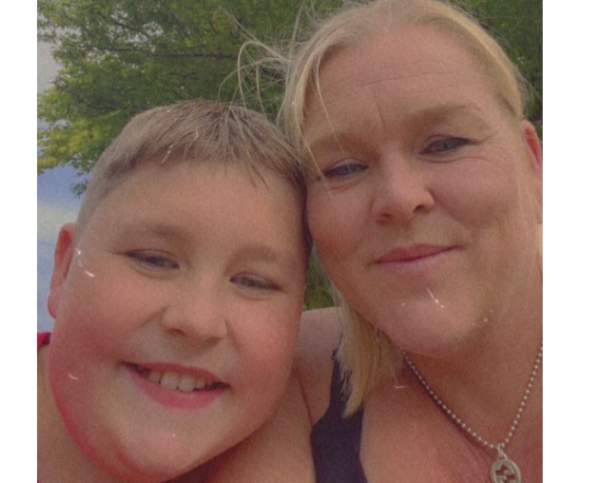It feels like there’s no thought or consideration, not just for people with neuromuscular conditions, but for disabled people in general – we’re forgotten yet again, during the pandemic, during the energy crisis. They say, “here, just have £150” – that’s more than appreciated, but again, it’s just not enough.
“It’s getting to a breaking point – a lot of disabled people are already living in poverty”

Sulaiman R. Khan is 37 and lives in east London. At 25, he helped set up the All-Party Parliamentary Group for young disabled people and has appeared on ITV, Channel 4, the BBC, the Guardian and various radio shows. He now runs his own consultancy and offers public speaking, strategic consulting and creative strategy for businesses.
I have congenital muscular dystrophy. I was born with it, and I’ve had it my whole life. I was diagnosed at 18 months and then at around nine years old I developed scoliosis as well. The older I get my muscles get weaker and weaker.
My everyday life is affected by the cost-of-living crisis
Like many disabled people, particularly in the winter, I use a lot of heating. If I get cold, my muscles get very painful and quite sore, so I have to have a consistent temperature throughout the year.
I also have a lot of equipment that requires electricity. For example, I have a ventilator that I use all day as well as a power wheelchair, batteries and other equipment that all need electricity. There isn’t anything I can do. I don’t have the option not to use it.
I also have a team of five or six carers who come into the house 24/7. Again, this means we have to use extra heating for that as well.
It’s very scary, because you don’t know how hard it’s going to get and what’s going to happen.
Last year, we were paying around £80 a month for gas and electric. As of April of this year , it went up to £501 a month.
It’s just really hard and unaffordable. Our bills have gone from £468 to £5,496 a year. While we received the £150 one-off payment and this was very welcome, it is not enough. It should be once a month at least.
Contacting customer services did not help
After being on the phone and trying to contact customer services for around three hours, they were quite rude and unsupportive. The only solution offered was the suggestion that I should take out a loan to pay the bill – it’s just so unhelpful. And then the person hung up the phone!
As you can imagine, it’s quite terrifying if you have a condition like mine. Those of us with long term conditions and particularly muscle-wasting conditions, don’t have a choice except to use heating, electric and gas.
It’s very scary, because you don’t know how hard it’s going to get and what’s going to happen.
All of these things lead to greater and unnecessary anxiety that I don’t need, and my family doesn’t need. I’m lucky to have a very supportive family, that is able to help and support me financially – but it’s not easy to cover the expenses.
This has taken a toll on my mental health
Being disabled is not easy as it is.
I have a very aggressive muscle-wasting condition and in the last six months to a year, my muscles have really, really deteriorated, faster than I’d like. On top of all of that, having greater stress and anxiety about how to pay just the basic bills – food, gas, electric – it often feels really overwhelming.
I have my own consultancy business and I’m quite lucky in that I have a few good clients, so I do get paid regularly. But I have to say, I still feel frustrated at having to spend all my money on things I have to have, like extra heating.
The government could do a lot more
For instance, I think the first thing is to have a register of disabled people that you could send to gas and electric companies to highlight that we shouldn’t be charged extra, just because we need these extra things – it should be subsidised.
Secondly, I think there need to be more grants available to disabled people, just to help us get through to the next year or 18 months, and more regular support.
Also, I think it would be good to have additional resources and grants to allow disabled people to have solar panels or renewable energy in their homes, as that additional installation cost is quite high.
I think it would be helpful for them to continue the support offered during the pandemic
During the pandemic, I couldn’t leave the house for 384 days. When the lockdown first happened, it was absolutely terrifying to go out of your house.
My family were reluctant to go out too because I was quite vulnerable, so we had regular food parcels that included milk, eggs and bread. That really helped us and that might be something they could start up again, to help disabled people with the cost of living.
It really needs to be dealt with sooner rather than later, because it’s getting to a breaking point – a lot of disabled people are already living in poverty, and more and more are being pushed into poverty.
I’m just keen to ensure that not only myself, but as many disabled people as possible are able to get the support they need – the right support at the right time.
We understand that these are difficult times and that you may be experiencing distress and concern. If you are struggling with the rising cost of living and want to know what help is available, please contact our Information, Advocacy and Care team on 0800 652 6352 or info@musculardystrophyuk.org, who can support you to access the information you need.
The impact of the cost-of-living crisis is far-reaching, with worrying consequences for people living with muscle-wasting conditions. Read our report and policy recommendations.
We want to hear about how you are being affected by rising costs. If you would like to share your experiences, email stories@musculardystrophyuk.org


